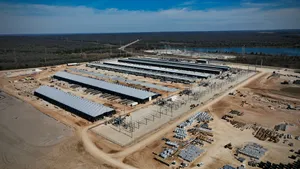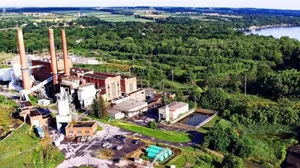Iris Energy Bitcoin mining firm close to defaulting on loans of $103 million
Core Scientific Bitcoin mining operator warns of missed payments, possible bankruptcy
Core Scientific blamed their precarious financial situation on "the prolonged decrease in the price of bitcoin, the increase in electricity costs, the increase in the global bitcoin network hash rate and the litigation with Celsius Networks LLC and its affiliates". Bankrupt crypto platform Celsius owes Core Scientific around $5.4 million.
Core Scientific's stock plummeted from around $1 a share to around $0.20 on the news, an 80% decrease. The stock started the year at $10.43 a share, and has decreased in value by 98% year-to-date.
Compute North, one of the largest crypto mining datacenters, files for bankruptcy
Investors face $11 million loss in VBit Technologies/Advanced Mining Group, an alleged crypto Ponzi scheme
However, customers trying to withdraw their "rewards" saw increasing delays in receiving their payouts — days, then weeks, then an indefinite pause. A COO hired by the group left the company only three weeks later. On June 27, the group sent an email to its customers explaining that there was a "potential pending settlement" with the SEC — the first customers heard of the existence of any investigation — and that they would no longer serve customers in the U.S. On July 15, the company promised to refund customers what they paid to sign up with the program, but no refunds or further updates have materialized.
The company has faced lawsuits in Washington state and Delaware, and apparently operated for two years after executives had acknowledged they were violating securities laws. The Delaware lawsuit describes the operation as a Ponzi scheme, and alleges that the company sold packages that would have required far more computing power than the company actually had access to.
- "Investors fear millions lost in Pennsylvania’s largest cryptocurrency scandal based in South Philly", The Philadelphia Inquirer
Poolin suspends withdrawals from their wallet service
Poolin users had been complaining about issues withdrawing from their Poolin wallets since at least August, which had sparked rumors of liquidity problems prior to the announcement. Poolin said in their announcement that they would announce their plans to resume withdrawals within two weeks. However, a week later, they instead told customers they would be receiving "IOU" tokens.
Bitcoin mining operation Riot Blockchain earns more money in July by not mining, effectively mines without paying for power
A press release from Riot proudly announced that "Riot curtailed a total of 11,717 megawatt hours in July, enough to power 13,121 average homes for one month", as though it is acceptable that they are normally using this amount of electricity solely to churn out Bitcoins.
They also wrote that "When applied to anticipated power costs for the month, the power credits and other benefits are expected to effectively eliminate Riot's power costs for July" — meaning that Texas residents are effectively subsidizing the cost of Bitcoin mining whether they like it or not. Meanwhile, the Texas Tribune and The Dallas Morning News report that many Texans are paying 50–70% more for electricity than this time last year.
Researchers identify an attack strategy actively being used by the second-largest Ethereum mining pool to earn outsized mining rewards
By manipulating the timestamps of blocks to be added to the chain, a miner can replace other miners' main-chain blocks with their own blocks, obtaining the fees that would have gone to the other miners. The attack has been called an "Uncle Maker" attack because Ethereum refers to valid but not main-chain blocks as "uncles".
F2Pool co-founder Chun Wang responded on August 8 to the allegations against his mining pool, apparently acknowledging their behavior and suggesting that manipulating a vulnerability in a system is not a "blatant disregard [of] the rules" as the researchers had characterized it. He tweeted: "We respect the *consensus* as is. If you don't like the consensus, convince [Ethereum developer Tim Beiko] to send me another Announcement and change it." Quote-tweeting a tweet by the lead author of the paper who described F2Pool's technique, he wrote, "I can't stop appreciate this elegant implementation of what we've done over the past two years... A robust system must withstand all kind of tests."
New York legislators pass moratorium on permits for fossil fuel powered crypto mining operations
Next, the bill will go to Governor Hochul to sign or veto.
Exxon Mobil reportedly gets in on Bitcoin mining
Some crypto proponents have spoken positively about using excess gas that would otherwise be flared for Bitcoin mining, though climate experts have spoken out against it being a sufficient or reasonable solution. "It's like if you had a leaky gasoline pipeline and, instead of fixing the problem, you plugged in a Humvee next to the leak and left the engine on in perpetuity with the A/C on full blast," said UC Santa Barbara professor Paasha Mahdavi.
New York power plant starts mining Bitcoin, increases emissions by 6x
Locals of the area have demanded that the Department of Environmental Conservation review the air emissions permit for the plant rather than renew an old one, which the DEC agreed to do, though they have delayed a new decision until March 31. Many pressing for permit review were unhappy with the delay, with the Seneca Lake Guardian reporting, "This delay from the DEC is not benign... Every day that Gov. Hochul and Commissioner Seggos drag their feet on this (permitting) decision is another day for Greenidge to continue expanding operations."
On June 30, regulators denied Greenidge's request to renew their permit.









